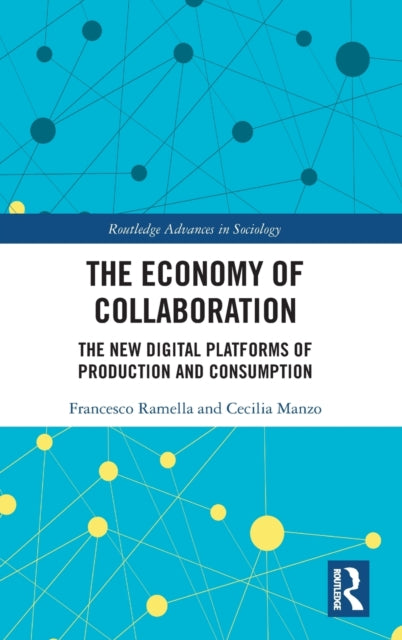FrancescoRamella,CeciliaManzo
Economy of Collaboration: The New Digital Platforms of Production and Consumption
Economy of Collaboration: The New Digital Platforms of Production and Consumption
YOU SAVE £6.96
- Condition: Brand new
- UK Delivery times: Usually arrives within 2 - 3 working days
- UK Shipping: Fee starts at £2.39. Subject to product weight & dimension
Bulk ordering. Want 15 or more copies? Get a personalised quote and bigger discounts. Learn more about bulk orders.
Couldn't load pickup availability
- More about Economy of Collaboration: The New Digital Platforms of Production and Consumption
The expansion of the digital economy and the internet of things has created a dilemma for capitalism about reconciling economic and social value. The Economy of Collaboration can offer a solution by creating shared value through cooperative relations in the digital economy. This book discusses how collaborative activities can be regulated along a continuum from market exchanges to generalized reciprocity.
Format: Hardback
Length: 204 pages
Publication date: 30 November 2020
Publisher: Taylor & Francis Ltd
Over the past few decades, the world economy has undergone a profound transformation, driven by the expansion of the 'digital economy' and the increasing interconnectedness of objects and physical processes through the internet. This 'great transformation' presents a dilemma regarding the ability of capitalism to reconcile economic and social value, ensuring the well-being of individuals, social cohesion, and political freedom.
The Economy of Collaboration can play a significant role in addressing this challenge. However, it necessitates bold policies to balance the diverse interests involved and to rethink and enhance the sustainability of its development, by increasing the benefits for businesses, workers, and consumers alike. In essence, the goal is to create shared value.
This book explores a model of organizing the production, distribution, and consumption of goods and services based on cooperative relations. While the primary focus is on activities related to the digital economy, which are emerging forms of a more established phenomenon, they are expanding on a vast scale thanks to new technologies. These collaborative activities can be regulated in different ways, ranging from market exchanges to generalized reciprocity, with various intermediate mixed forms.
The digital economy has brought about significant changes in the way we work, communicate, and consume goods and services. It has facilitated the creation of new business models, enabled global trade, and opened up opportunities for innovation and entrepreneurship. However, it has also raised concerns about job displacement, income inequality, and the concentration of power in the hands of a few large corporations.
The Economy of Collaboration seeks to address these challenges by promoting a more decentralized and inclusive economic system. It emphasizes the importance of collaboration, cooperation, and mutual benefit among stakeholders, including businesses, workers, and consumers. By fostering a culture of shared value, where everyone involved in the production and distribution of goods and services benefits, we can create a more sustainable and equitable economy.
One of the key principles of the Economy of Collaboration is the recognition of the value of human capital. Human beings are not just resources to be exploited but are active contributors to the economy and society. The book advocates for policies that promote worker empowerment, education, and training, to ensure that individuals have the skills and knowledge necessary to participate fully in the economy.
Another important aspect of the Economy of Collaboration is the promotion of sustainable development. The book recognizes that the current economic system is unsustainable, and that we need to transition towards a more circular and resource-efficient economy. This requires a shift towards renewable energy sources, the reduction of waste and pollution, and the promotion of sustainable consumption and production practices.
To achieve these goals, the book proposes a range of policies and initiatives, including the creation of cooperative businesses, the development of shared infrastructure, and the implementation of policies that promote worker ownership and control. It also emphasizes the importance of public-private partnerships, where government and industry work together to promote sustainable development and create jobs.
In conclusion, the Economy of Collaboration offers a vision for a more sustainable and equitable future. By promoting a more decentralized and inclusive economic system, where everyone involved in the production and distribution of goods and services benefits, we can create a more prosperous and sustainable world. However, achieving this vision will require bold policies and initiatives, as well as a collective commitment to change.
Weight: 468g
Dimension: 161 x 241 x 21 (mm)
ISBN-13: 9780367404024
This item can be found in:
UK and International shipping information
UK and International shipping information
UK Delivery and returns information:
- Delivery within 2 - 3 days when ordering in the UK.
- Shipping fee for UK customers from £2.39. Fully tracked shipping service available.
- Returns policy: Return within 30 days of receipt for full refund.
International deliveries:
Shulph Ink now ships to Australia, Belgium, Canada, France, Germany, Ireland, Italy, India, Luxembourg Saudi Arabia, Singapore, Spain, Netherlands, New Zealand, United Arab Emirates, United States of America.
- Delivery times: within 5 - 10 days for international orders.
- Shipping fee: charges vary for overseas orders. Only tracked services are available for most international orders. Some countries have untracked shipping options.
- Customs charges: If ordering to addresses outside the United Kingdom, you may or may not incur additional customs and duties fees during local delivery.


